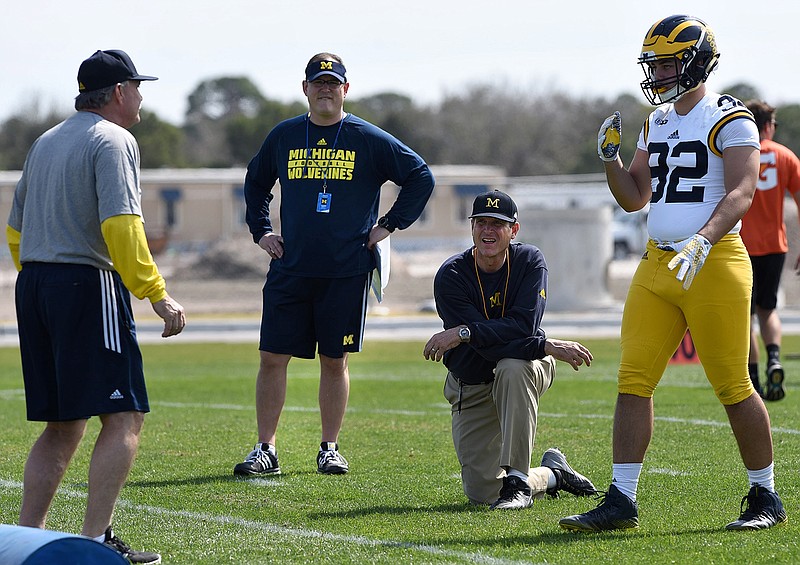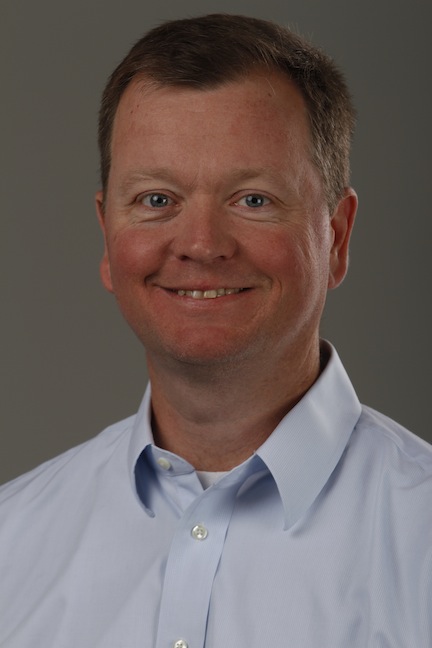There has been a lot of hand-wringing about where Michigan football coach Jim Harbaugh holds his practices and camps.
The controversial - by design, mind you - Wolverines boss spent a week doing spring practice at the nation's most talent-rich high school last month. Last year, Harbaugh held a football camp in Alabama to get his program in front of players who may not have the means to get to Ann Arbor for whatever reason.
The thinking was ingenious. Michigan spring practice was being discussed everywhere, and we even spent a fair amount of time on Harbaugh and the thought process on "Press Row" on ESPN 105.1 FM here in Chattanooga.
Michigan football in March being a hot topic in Chattanooga. That, in and of itself, made this a great idea.
But that idea was met with severe backlash. The ever-sensitive Southeastern coaches did not want power programs from other conferences coming into the talent-rich recruiting areas of the South with extended camps. The Atlantic Coast Conference felt the same way.
So the schools acted and voted and the NCAA banned satellite camps, effective immediately late last week.
The NCAA's decision was understandable, at least as a matter of protocol. Six of the 10 conferences voted for the practice to be discontinued. That's how things work. (That said, the backlash against Harbaugh and his continual social media barrage against his colleagues kind of tainted this idea from the start in some ways. Case in point, the Big Ten was the only power conference to vote against the rule change, but the quote from Michigan State coach Mark Dantonio, who is against the rule, was telling: "I guess abuse brings control.")
The ideology behind the rule change - and a fairly large byproduct of that change - as well as the immediacy of this action, however, generate a few questions.
First, what's the thought about changing this rule? In some bizarro world, maybe you could rationalize competitive balance, since it can be fairly expensive to operate and not an option for every program. And if the rule had not been put in place across all conferences - before the change, the SEC and the ACC did not allow satellite camps - it would have been a way more prevalent practice sooner rather than later among the power programs.
In truth, is that a bad thing in theory since more players would get more exposure? The biggest casualty here is the prospective high school players who would have had more chances to perform at camps before bigger audiences. How is hindering teenagers' chances to be seen because of a recruiting turf war the goal of any organization - be they specific college programs, conferences or even the NCAA?
"I don't know if there was a genuine determination to further oppress low-income families, but that's essentially the effect that this rule on satellite camps has," Washington State coach Mike Leach said on Sirius Radio this week.
The language of this rule offers a very disturbing byproduct for a majority of the schools, too. The rule states coaches can't work camps that are not at their university, meaning smaller FBS schools - conferences such as the MAC and the Sun Belt - won't be able to send coaches to camps at Tennessee or Alabama or Auburn or Ohio State or wherever to get a glimpse at the thousands of players there. A big camp could attract more than 1,000 campers, and only a handful would get an offer from the Tide or the Buckeyes. But there are dozens of programs there looking to fill out their rosters, too.
The logic behind the smaller conferences such as the Sun Belt and the Mountain West voting in favor of the ban is extremely puzzling, since the programs in those conferences get a lot of bang for their buck by going to camps at other schools. The SEC and the ACC voting against satellite camps is understandable; everyone else voting against them, though, is a little bit strange considering the wording of the rule.
Also of note is how quickly the NCAA acted on this. An organization that normally causes sloths to be stunned by its deliberateness, the NCAA reacted to satellite camps with rocket-fuel speed.
Sometimes, though, quicker is not better. And at least in the grand scheme of things the overall appearance of the consequences for the power brokers in college sports from this knee-jerk reaction is more jerky than anything else.
Contact Jay Greeson at jgreeson@timesfreepress.com or 423-757-6343. Follow him on Twitter @jgreesontfp.

